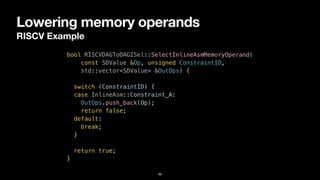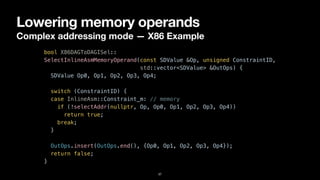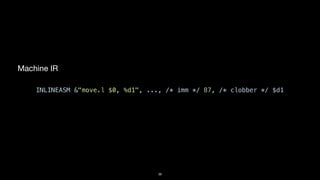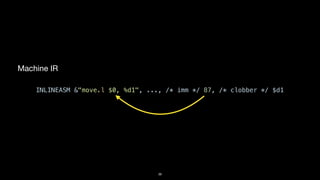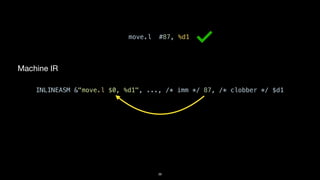Handling inline assembly in Clang and LLVM
- 1. Min-Yih “Min” Hsu @ LLVM Dev Meeting 2021 Handling inline assembly in Clang and LLVM
- 2. about:me “Min” Hsu • Computer Science PhD Candidate in University of California, Irvine • Code owner of M68k LLVM backend • Author of book “LLVM Techniques, Tips and Best Practices” (2021) 2
- 3. How Inline Assembly is Processed in Clang & LLVM 3
- 5. Introduction to inline assembly 5 void foo(...) { int sum = 0; bool flag = ...; if (flag) asm ("movl %%eax, %%ebxn" "addl %%ebx, %%esi" :::); else sum += 87; } * x86_64 assembly w/ AT&T syntax
- 6. Introduction to inline assembly 5 void foo(...) { int sum = 0; bool flag = ...; if (flag) asm ("movl %%eax, %%ebxn" "addl %%ebx, %%esi" :::); else sum += 87; } * x86_64 assembly w/ AT&T syntax
- 7. Introduction to inline assembly 5 void foo(...) { int sum = 0; bool flag = ...; if (flag) asm ("movl %%eax, %%ebxn" "addl %%ebx, %%esi" :::); else sum += 87; } foo: pushq %rbp movq %rsp, %rbp ... testb $1, -9(%rbp) je LBB0_2 ## InlineAsm Start movl %eax, %ebx addl %ebx, %esi ## InlineAsm End jmp LBB0_3 LBB0_2: movl -8(%rbp), %eax addl $87, %eax movl %eax, -8(%rbp) LBB0_3: popq %rbp retq * x86_64 assembly w/ AT&T syntax
- 8. Introduction to inline assembly 5 void foo(...) { int sum = 0; bool flag = ...; if (flag) asm ("movl %%eax, %%ebxn" "addl %%ebx, %%esi" :::); else sum += 87; } foo: pushq %rbp movq %rsp, %rbp ... testb $1, -9(%rbp) je LBB0_2 ## InlineAsm Start movl %eax, %ebx addl %ebx, %esi ## InlineAsm End jmp LBB0_3 LBB0_2: movl -8(%rbp), %eax addl $87, %eax movl %eax, -8(%rbp) LBB0_3: popq %rbp retq * x86_64 assembly w/ AT&T syntax
- 9. Introduction to inline assembly Why use inline assembly? 6 void foo(...) { int sum = 0; bool flag = ...; if (flag) asm ("movl %%eax, %%ebxn" "addl %%ebx, %%esi" :::); else sum += 87; } * x86_64 assembly w/ AT&T syntax
- 10. Introduction to inline assembly Why use inline assembly? 6 void foo(...) { int sum = 0; bool flag = ...; if (flag) asm ("movl %%eax, %%ebxn" "addl %%ebx, %%esi" :::); else sum += 87; } Performance critical code * x86_64 assembly w/ AT&T syntax
- 11. Introduction to inline assembly Why use inline assembly? 6 void foo(...) { int sum = 0; bool flag = ...; if (flag) asm ("movl %%eax, %%ebxn" "addl %%ebx, %%esi" :::); else sum += 87; } Performance critical code Low-level code e.g. Kernel, firmware * x86_64 assembly w/ AT&T syntax
- 12. Introduction to inline assembly Why use inline assembly? 6 void foo(...) { int sum = 0; bool flag = ...; if (flag) asm ("movl %%eax, %%ebxn" "addl %%ebx, %%esi" :::); else sum += 87; } Performance critical code Low-level code e.g. Kernel, firmware Compiler optimizations “barrier” * x86_64 assembly w/ AT&T syntax
- 13. Introduction to inline assembly 7 asm (“movl %%eax, %%ebxn" "addl %%ebx, %%esi" :::); * x86_64 assembly w/ AT&T syntax
- 14. Introduction to inline assembly 7 asm (“movl %%eax, %%ebxn" "addl %%ebx, %%esi" :::); Assembly code (template) * x86_64 assembly w/ AT&T syntax
- 15. Introduction to inline assembly 7 asm (“movl %%eax, %%ebxn" "addl %%ebx, %%esi" :::); Assembly code (template) * x86_64 assembly w/ AT&T syntax
- 16. Introduction to inline assembly Output operands 8 int out_var; asm ("movl %%eax, %%ebxn" "addl %%ebx, %0" : "=r"(out_var) ::); * x86_64 assembly w/ AT&T syntax
- 17. Introduction to inline assembly Output operands 8 int out_var; asm ("movl %%eax, %%ebxn" "addl %%ebx, %0" : "=r"(out_var) ::); * x86_64 assembly w/ AT&T syntax
- 18. Introduction to inline assembly Output operands 8 int out_var; asm ("movl %%eax, %%ebxn" "addl %%ebx, %0" : "=r"(out_var) ::); Operand constraints * x86_64 assembly w/ AT&T syntax
- 19. Introduction to inline assembly Operands constraints 9 int out_var; asm ("movl %%eax, %%ebxn" "addl %%ebx, %0" : "=r"(out_var) ::); * x86_64 assembly w/ AT&T syntax
- 20. Introduction to inline assembly Operands constraints 9 int out_var; asm ("movl %%eax, %%ebxn" "addl %%ebx, %0" : "=r"(out_var) ::); * x86_64 assembly w/ AT&T syntax ## InlineAsm Start movl %eax, %ebx addl %ebx, %esi ## InlineAsm End
- 21. Introduction to inline assembly Operands constraints 9 int out_var; asm ("movl %%eax, %%ebxn" "addl %%ebx, %0" : "=r"(out_var) ::); * x86_64 assembly w/ AT&T syntax ## InlineAsm Start movl %eax, %ebx addl %ebx, %esi ## InlineAsm End ## InlineAsm Start movl %eax, %ebx addl %ebx, -8(%ebp) ## InlineAsm End
- 23. Operand constraints 10 • ‘r’ : General-purpose register operand • ‘i’ : Immediate integer operand • ‘m’ : Memory operand w/ arbitrary addressing mode Target-independent Constraints
- 24. Operand constraints 10 • ‘r’ : General-purpose register operand • ‘i’ : Immediate integer operand • ‘m’ : Memory operand w/ arbitrary addressing mode Target-independent Constraints • ‘a’ : AL / AH / EAX / RAX • ‘I’ : Integer constant in the range of [0, 31] • ‘N’ : Unsigned 8-bit integer constant X86 Constraints
- 25. Operand constraints 10 • ‘r’ : General-purpose register operand • ‘i’ : Immediate integer operand • ‘m’ : Memory operand w/ arbitrary addressing mode Target-independent Constraints • ‘a’ : AL / AH / EAX / RAX • ‘I’ : Integer constant in the range of [0, 31] • ‘N’ : Unsigned 8-bit integer constant X86 Constraints • ‘J’ : 16-bit signed integer constant • “Ci” : Constant integers • “Cj” : Constant signed integers that do NOT fi t in 16 bits M68k Constraints
- 26. Operand constraints 10 • ‘r’ : General-purpose register operand • ‘i’ : Immediate integer operand • ‘m’ : Memory operand w/ arbitrary addressing mode Constraint Modifers Target-independent Constraints • ‘=‘ : This is an output operand • ‘+’ : This is an input / output operand • ‘a’ : AL / AH / EAX / RAX • ‘I’ : Integer constant in the range of [0, 31] • ‘N’ : Unsigned 8-bit integer constant X86 Constraints • ‘J’ : 16-bit signed integer constant • “Ci” : Constant integers • “Cj” : Constant signed integers that do NOT fi t in 16 bits M68k Constraints
- 27. Introduction to inline assembly Input operands 11 int out_var, in_var; asm ("movl %1, %%ebxn" "addl %%ebx, %0" : “=r"(out_var) : “r”(in_var) :); * x86_64 assembly w/ AT&T syntax
- 28. Introduction to inline assembly Input operands 11 int out_var, in_var; asm ("movl %1, %%ebxn" "addl %%ebx, %0" : “=r"(out_var) : “r”(in_var) :); * x86_64 assembly w/ AT&T syntax
- 29. Introduction to inline assembly Input operands 11 int out_var, in_var; asm ("movl %1, %%ebxn" "addl %%ebx, %0" : “=r"(out_var) : “r”(in_var) :); Operand constraints * x86_64 assembly w/ AT&T syntax
- 30. Introduction to inline assembly Clobber operands 12 int out_var, in_var; asm ("movl %1, %%ebxn" "addl %%ebx, %0" : “=r"(out_var) : “r”(in_var) : “ebx”); * x86_64 assembly w/ AT&T syntax
- 31. Introduction to inline assembly Clobber operands 12 int out_var, in_var; asm ("movl %1, %%ebxn" "addl %%ebx, %0" : “=r"(out_var) : “r”(in_var) : “ebx”); * x86_64 assembly w/ AT&T syntax
- 32. For more inline assembly syntax… 13 https://gcc.gnu.org/onlinedocs/gcc/Extended-Asm.html
- 33. Handling inline assembly in Clang & LLVM Background 14
- 34. Handling inline assembly in Clang & LLVM Background • Most parts of an inline assembly string are simply copied into the fi nal assembly fi le 14
- 35. Handling inline assembly in Clang & LLVM Background • Most parts of an inline assembly string are simply copied into the fi nal assembly fi le • LLVM needs to “glue” inline assembly operands with the surrounding code 14
- 36. Handling inline assembly in Clang & LLVM Background • Most parts of an inline assembly string are simply copied into the fi nal assembly fi le • LLVM needs to “glue” inline assembly operands with the surrounding code • Lots of target-speci fi c logics • In both Clang and the backend 14
- 37. Handling inline assembly in Clang & LLVM Background • Most parts of an inline assembly string are simply copied into the fi nal assembly fi le • LLVM needs to “glue” inline assembly operands with the surrounding code • Lots of target-speci fi c logics • In both Clang and the backend • Target-speci fi c callbacks are scattered in the codebase • Documentation for this part is a little…shy 14
- 38. Goals 15
- 39. Goals Learning inline assembly workflow in Clang / LLVM 15
- 40. Goals Learning inline assembly workflow in Clang / LLVM A simple guide for backend developers to add inline assembly support 15
- 41. Outline of target-specific logics in each stage 16 Clang Lowering LLVM IR Machine IR AsmPrinter
- 42. Outline of target-specific logics in each stage 16 Clang Lowering LLVM IR Machine IR AsmPrinter • Simple validation on operand constraints • Converting constraints
- 43. Outline of target-specific logics in each stage 16 Clang Lowering LLVM IR Machine IR AsmPrinter • Simple validation on operand constraints • Converting constraints • Classifying constraints • Constraint validations • Lowering the operands
- 44. Outline of target-specific logics in each stage 16 Clang Lowering LLVM IR Machine IR AsmPrinter • Simple validation on operand constraints • Converting constraints • Classifying constraints • Constraint validations • Lowering the operands Print out di ff erent types of operands
- 45. Outline of target-specific logics in each stage 17 Clang Lowering LLVM IR Machine IR AsmPrinter • Simple validation on operand constraints • Converting constraints • Classifying constraints • Constraint validations • Lowering the operands Print out di ff erent types of operands
- 46. Operand constraint validations in Clang 18 bool TargetInfo::validateAsmConstraint(const char *&, ConstraintInfo &) const;
- 47. Operand constraint validations in Clang 18 bool TargetInfo::validateAsmConstraint(const char *&, ConstraintInfo &) const; bool M68kTargetInfo::validateAsmConstraint(const char *&Name, ConstraintInfo &info) const { switch (*Name) { case 'a': // address register info.setAllowsRegister(); return true; } … }
- 48. Operand constraint validations in Clang 19 bool TargetInfo::validateAsmConstraint(const char *&, ConstraintInfo &) const; bool M68kTargetInfo::validateAsmConstraint(const char *&Name, ConstraintInfo &info) const { switch (*Name) { case 'a': // address register info.setAllowsRegister(); return true; case 'J': // constant signed 16-bit integer info.setRequiresImmediate(std::numeric_limits<int16_t>::min(), std::numeric_limits<int16_t>::max()); return true; } … }
- 49. Operand constraint validations in Clang Limitation on immediate value validations 20 void foo() { int32_t x; asm ("move.l %0, %%d1" : : "J" (x)); } * M68k assembly w/ Motorola syntax
- 50. Operand constraint validations in Clang Limitation on immediate value validations 20 void foo() { int32_t x; asm ("move.l %0, %%d1" : : "J" (x)); } Constant signed 16-bit integer * M68k assembly w/ Motorola syntax
- 51. Operand constraint validations in Clang Limitation on immediate value validations 20 void foo() { int32_t x; asm ("move.l %0, %%d1" : : "J" (x)); } $ clang -target m68k -fsyntax-only foo.c # No error $ clang -target m68k -emit-llvm foo.c # No error Constant signed 16-bit integer * M68k assembly w/ Motorola syntax
- 52. Operand constraint validations in Clang Limitation on immediate value validations 20 void foo() { int32_t x; asm ("move.l %0, %%d1" : : "J" (x)); } $ clang -target m68k -fsyntax-only foo.c # No error $ clang -target m68k -emit-llvm foo.c # No error Constant signed 16-bit integer $ clang -target m68k -S foo.c error: constraint 'J' expects an integer constant expression * M68k assembly w/ Motorola syntax
- 53. Inline assembly in LLVM IR 21 void foo() { const int x = 87; asm ("move.l %0, %%d1" : : "Ci" (x) : "d1"); } C/C++ * M68k assembly w/ Motorola syntax
- 54. Inline assembly in LLVM IR 21 void foo() { const int x = 87; asm ("move.l %0, %%d1" : : "Ci" (x) : "d1"); } C/C++ call void asm sideeffect "move.l $0, %d1", “^Ci,~{d1}“(i32 87) LLVM IR * M68k assembly w/ Motorola syntax
- 55. Inline assembly in LLVM IR 21 void foo() { const int x = 87; asm ("move.l %0, %%d1" : : "Ci" (x) : "d1"); } C/C++ call void asm sideeffect "move.l $0, %d1", “^Ci,~{d1}“(i32 87) LLVM IR * M68k assembly w/ Motorola syntax
- 56. Inline assembly in LLVM IR 21 void foo() { const int x = 87; asm ("move.l %0, %%d1" : : "Ci" (x) : "d1"); } C/C++ call void asm sideeffect "move.l $0, %d1", “^Ci,~{d1}“(i32 87) LLVM IR * M68k assembly w/ Motorola syntax
- 57. Inline assembly in LLVM IR 21 void foo() { const int x = 87; asm ("move.l %0, %%d1" : : "Ci" (x) : "d1"); } C/C++ call void asm sideeffect "move.l $0, %d1", “^Ci,~{d1}“(i32 87) LLVM IR * M68k assembly w/ Motorola syntax
- 58. Inline assembly in LLVM IR 21 void foo() { const int x = 87; asm ("move.l %0, %%d1" : : "Ci" (x) : "d1"); } C/C++ call void asm sideeffect "move.l $0, %d1", “^Ci,~{d1}“(i32 87) LLVM IR * M68k assembly w/ Motorola syntax
- 59. Outline of target-specific logics in each stage 22 Clang Lowering LLVM IR Machine IR AsmPrinter • Simple validation on operand constraints • Converting constraints • Classifying constraints • Constraint validations • Lowering the operands Print out di ff erent types of operands
- 60. 23 LLVM IR call void asm sideeffect "move.l $0, %d1", “^Ci,~{d1}“(i32 87)
- 61. 23 LLVM IR SelectionDAG call void asm sideeffect "move.l $0, %d1", “^Ci,~{d1}“(i32 87) t2: ch,glue = inlineasm ... "move.l $0, %d1", ..., TargetConstant:i32<87>, Register:i16 $d1
- 62. 23 LLVM IR SelectionDAG Machine IR call void asm sideeffect "move.l $0, %d1", “^Ci,~{d1}“(i32 87) INLINEASM &"move.l $0, %d1", ..., /* imm */ 87, /* clobber */ $d1 t2: ch,glue = inlineasm ... "move.l $0, %d1", ..., TargetConstant:i32<87>, Register:i16 $d1
- 63. 23 LLVM IR SelectionDAG Machine IR call void asm sideeffect "move.l $0, %d1", “^Ci,~{d1}“(i32 87) INLINEASM &"move.l $0, %d1", ..., /* imm */ 87, /* clobber */ $d1 t2: ch,glue = inlineasm ... "move.l $0, %d1", ..., TargetConstant:i32<87>, Register:i16 $d1
- 65. Constraint classification 24 TargetLowering::ConstraintType M68kTargetLowering::getConstraintType(StringRef Constraint) const; Return:
- 66. Constraint classification 24 TargetLowering::ConstraintType M68kTargetLowering::getConstraintType(StringRef Constraint) const; • C_RegisterClass Return: Ex: ’r’
- 67. Constraint classification 24 TargetLowering::ConstraintType M68kTargetLowering::getConstraintType(StringRef Constraint) const; • C_RegisterClass • C_Immediate Return: Ex: ’r’ Ex: ‘i’
- 68. Constraint classification 24 TargetLowering::ConstraintType M68kTargetLowering::getConstraintType(StringRef Constraint) const; • C_RegisterClass • C_Immediate • C_Memory Return: Ex: ’r’ Ex: ‘i’ Ex: ‘m’, ‘Q’ (AArch64)
- 69. Constraint classification 24 TargetLowering::ConstraintType M68kTargetLowering::getConstraintType(StringRef Constraint) const; • C_RegisterClass • C_Immediate • C_Memory • C_Other Return: Ex: ’r’ Ex: ‘i’ Ex: ‘m’, ‘Q’ (AArch64)
- 70. Lowering operands 25 getConstraintType Method in XXXTargetLowering Method in XXXISelDAGToDAG Will be invoked
- 71. Lowering operands 25 getConstraintType getRegForInlineAsmConstraint C_RegisterClass Method in XXXTargetLowering Method in XXXISelDAGToDAG Will be invoked
- 72. Lowering operands 25 getConstraintType getRegForInlineAsmConstraint LowerAsmOperandForConstraint C_RegisterClass C_Immediate / C_Other Method in XXXTargetLowering Method in XXXISelDAGToDAG Will be invoked
- 73. Lowering operands 25 getConstraintType getRegForInlineAsmConstraint getInlineAsmMemConstraint LowerAsmOperandForConstraint C_RegisterClass C_Immediate / C_Other C_Memory Method in XXXTargetLowering Method in XXXISelDAGToDAG Will be invoked
- 74. Lowering operands 25 getConstraintType getRegForInlineAsmConstraint getInlineAsmMemConstraint LowerAsmOperandForConstraint SelectInlineAsmMemoryOperand C_RegisterClass C_Immediate / C_Other C_Memory Method in XXXTargetLowering Method in XXXISelDAGToDAG Will be invoked
- 75. Lowering register operands 26 std::pair<unsigned, const TargetRegisterClass *> TargetLowering::getRegForInlineAsmConstraint(const TargetRegisterInfo *TRI, StringRef Constraint, MVT VT) const;
- 76. Lowering register operands 26 std::pair<unsigned, const TargetRegisterClass *> TargetLowering::getRegForInlineAsmConstraint(const TargetRegisterInfo *TRI, StringRef Constraint, MVT VT) const; A speci fi c register or 0 if not applicable
- 77. Lowering register operands 26 std::pair<unsigned, const TargetRegisterClass *> TargetLowering::getRegForInlineAsmConstraint(const TargetRegisterInfo *TRI, StringRef Constraint, MVT VT) const; A speci fi c register or 0 if not applicable Valid register class to select from
- 78. Lowering register operands M68k Example 27 std::pair<unsigned, const TargetRegisterClass *> M68kTargetLowering::getRegForInlineAsmConstraint(const TargetRegisterInfo *, StringRef Constraint, MVT VT) const { switch (Constraint[0]) { case 'a': switch (VT.SimpleTy) { case MVT::i16: return std::make_pair(0U, &M68k::AR16RegClass); } } }
- 79. Lowering register operands M68k Example 27 std::pair<unsigned, const TargetRegisterClass *> M68kTargetLowering::getRegForInlineAsmConstraint(const TargetRegisterInfo *, StringRef Constraint, MVT VT) const { switch (Constraint[0]) { case 'a': switch (VT.SimpleTy) { case MVT::i16: return std::make_pair(0U, &M68k::AR16RegClass); } } }
- 80. Lowering register operands X86 Example 28 std::pair<unsigned, const TargetRegisterClass *> X86TargetLowering::getRegForInlineAsmConstraint(const TargetRegisterInfo *, StringRef Constraint, MVT VT) const { ... if (Constraint == "Yz") { // First SSE register (%xmm0). switch (VT.SimpleTy) { case MVT::f32: case MVT::i32: return std::make_pair(X86::XMM0, &X86::FR32RegClass); } } }
- 81. Lowering register operands X86 Example 28 std::pair<unsigned, const TargetRegisterClass *> X86TargetLowering::getRegForInlineAsmConstraint(const TargetRegisterInfo *, StringRef Constraint, MVT VT) const { ... if (Constraint == "Yz") { // First SSE register (%xmm0). switch (VT.SimpleTy) { case MVT::f32: case MVT::i32: return std::make_pair(X86::XMM0, &X86::FR32RegClass); } } }
- 82. Lowering immediate / other operands 29 void TargetLowering:: LowerAsmOperandForConstraint(SDValue Op, std::string &Constraint, std::vector<SDValue> &Ops, SelectionDAG &DAG) const;
- 83. Lowering immediate / other operands M68k Example 30 void M68kTargetLowering::LowerAsmOperandForConstraint(SDValue Op, std::string &Constraint, std::vector<SDValue> &Ops, SelectionDAG &DAG) const { switch (Constraint[0]) { case 'J': { // constant signed 16-bit integer } } }
- 84. Lowering immediate / other operands M68k Example 31 void M68kTargetLowering::LowerAsmOperandForConstraint(SDValue Op, std::string &Constraint, std::vector<SDValue> &Ops, SelectionDAG &DAG) const { switch (Constraint[0]) { case 'J': { // constant signed 16-bit integer if (auto *C = dyn_cast<ConstantSDNode>(Op)) { int64_t Val = C->getSExtValue(); } } } }
- 85. Lowering immediate / other operands M68k Example 32 void M68kTargetLowering::LowerAsmOperandForConstraint(SDValue Op, std::string &Constraint, std::vector<SDValue> &Ops, SelectionDAG &DAG) const { switch (Constraint[0]) { case 'J': { // constant signed 16-bit integer if (auto *C = dyn_cast<ConstantSDNode>(Op)) { int64_t Val = C->getSExtValue(); if (isInt<16>(Val)) { Ops.push_back(Op); return; } } } } }
- 86. Lowering memory operands Memory constraint classi fi cation 33 unsigned TargetLowering::getInlineAsmMemConstraint(StringRef ConstraintCode) const;
- 87. Lowering memory operands Memory constraint classi fi cation 33 unsigned TargetLowering::getInlineAsmMemConstraint(StringRef ConstraintCode) const; Return:
- 88. Lowering memory operands Memory constraint classi fi cation 33 unsigned TargetLowering::getInlineAsmMemConstraint(StringRef ConstraintCode) const; • InlineAsm::Constraint_m • InlineAsm::Constraint_o • InlineAsm::Constraint_v Return: Generic memory constraints
- 89. Lowering memory operands Memory constraint classi fi cation 33 unsigned TargetLowering::getInlineAsmMemConstraint(StringRef ConstraintCode) const; • InlineAsm::Constraint_m • InlineAsm::Constraint_o • InlineAsm::Constraint_v Return: • InlineAsm::Constraint_A • InlineAsm::Constraint_Q Generic memory constraints Target-speci fi c constraints!
- 90. Lowering memory operands Memory constraint classi fi cation — RISCV Example 34 unsigned RISCVTargetLowering:: getInlineAsmMemConstraint(StringRef ConstraintCode) const { switch (ConstraintCode[0]) { case 'A': return InlineAsm::Constraint_A; ... } ... }
- 91. Lowering memory operands 35 bool SelectionDAGISel::SelectInlineAsmMemoryOperand(const SDValue &Op, unsigned ConstraintID, std::vector<SDValue> &OutOps);
- 92. Lowering memory operands RISCV Example 36 bool RISCVDAGToDAGISel::SelectInlineAsmMemoryOperand( const SDValue &Op, unsigned ConstraintID, std::vector<SDValue> &OutOps) { switch (ConstraintID) { case InlineAsm::Constraint_A: OutOps.push_back(Op); return false; default: break; } return true; }
- 93. Lowering memory operands Complex addressing mode — X86 Example 37 bool X86DAGToDAGISel:: SelectInlineAsmMemoryOperand(const SDValue &Op, unsigned ConstraintID, std::vector<SDValue> &OutOps) { SDValue Op0, Op1, Op2, Op3, Op4; switch (ConstraintID) { case InlineAsm::Constraint_m: // memory if (!selectAddr(nullptr, Op, Op0, Op1, Op2, Op3, Op4)) return true; break; } OutOps.insert(OutOps.end(), {Op0, Op1, Op2, Op3, Op4}); return false; }
- 94. Lowering memory operands Complex addressing mode — X86 Example 37 bool X86DAGToDAGISel:: SelectInlineAsmMemoryOperand(const SDValue &Op, unsigned ConstraintID, std::vector<SDValue> &OutOps) { SDValue Op0, Op1, Op2, Op3, Op4; switch (ConstraintID) { case InlineAsm::Constraint_m: // memory if (!selectAddr(nullptr, Op, Op0, Op1, Op2, Op3, Op4)) return true; break; } OutOps.insert(OutOps.end(), {Op0, Op1, Op2, Op3, Op4}); return false; }
- 95. Outline of target-specific logics in each stage 38 Clang Lowering LLVM IR Machine IR AsmPrinter • Simple validation on operand constraints • Converting constraints • Classifying constraints • Constraint validations • Lowering the operands Print out di ff erent types of operands
- 96. 39 Machine IR INLINEASM &"move.l $0, %d1", ..., /* imm */ 87, /* clobber */ $d1
- 97. 39 Machine IR INLINEASM &"move.l $0, %d1", ..., /* imm */ 87, /* clobber */ $d1
- 98. 39 Machine IR INLINEASM &"move.l $0, %d1", ..., /* imm */ 87, /* clobber */ $d1 move.l #87, %d1
- 99. 39 Machine IR INLINEASM &"move.l $0, %d1", ..., /* imm */ 87, /* clobber */ $d1 move.l 87, %d1 move.l #87, %d1
- 100. Printing asm operands 40 bool AsmPrinter::PrintAsmOperand(const MachineInstr *MI, unsigned OpNo, const char *, raw_ostream &O); bool AsmPrinter::PrintAsmMemoryOperand(const MachineInstr *MI, unsigned OpNo, const char *, raw_ostream &O);
- 101. Printing non-memory asm operands M68k Example 41 void M68kAsmPrinter::printOperand(const MachineInstr *MI, int OpNum, raw_ostream &OS) { const MachineOperand &MO = MI->getOperand(OpNum); switch (MO.getType()) { case MachineOperand::MO_Register: OS << "%" << M68kInstPrinter::getRegisterName(MO.getReg()); break; case MachineOperand::MO_Immediate: OS << '#' << MO.getImm(); break; ... } }
- 102. Printing non-memory asm operands M68k Example 41 void M68kAsmPrinter::printOperand(const MachineInstr *MI, int OpNum, raw_ostream &OS) { const MachineOperand &MO = MI->getOperand(OpNum); switch (MO.getType()) { case MachineOperand::MO_Register: OS << "%" << M68kInstPrinter::getRegisterName(MO.getReg()); break; case MachineOperand::MO_Immediate: OS << '#' << MO.getImm(); break; ... } }
- 103. Printing non-memory asm operands M68k Example 41 void M68kAsmPrinter::printOperand(const MachineInstr *MI, int OpNum, raw_ostream &OS) { const MachineOperand &MO = MI->getOperand(OpNum); switch (MO.getType()) { case MachineOperand::MO_Register: OS << "%" << M68kInstPrinter::getRegisterName(MO.getReg()); break; case MachineOperand::MO_Immediate: OS << '#' << MO.getImm(); break; ... } }
- 104. Epilogue
- 105. Advanced topics Converting constraints in Clang Asm dialects Operand modifiers Multi-alternative constraints Constraint weights Turn (simple) inline asm into LLVM code 43
- 106. Thank you! 44 GitHub: mshockwave Email: [email protected] 25% book discount code: 25MINLLVM Redeem: Nov 15 ~ Nov 20, 2021
- 107. Appendix
- 108. Converting constraints in Clang 46 An operand constraint is assumed to have only a single character by default
- 109. Converting constraints in Clang 46 An operand constraint is assumed to have only a single character by default Example: “Ci”
- 110. Converting constraints in Clang 46 An operand constraint is assumed to have only a single character by default Example: “Ci” -> “^Ci”
- 111. Converting constraints in Clang 46 std::string M68kTargetInfo::convertConstraint(const char *&Constraint) const override { if (*Constraint == 'C') // Two-character constraint; add "^" hint for later parsing return std::string("^") + std::string(Constraint++, 2); return std::string(1, *Constraint); } An operand constraint is assumed to have only a single character by default Example: “Ci” -> “^Ci”
- 112. Operand constraint validations in Clang Limitation on immediate value validations (cont’d) 47 bool M68kTargetInfo::validateAsmConstraint(const char *&Name, ConstraintInfo &info) const { switch (*Name) { … case 'C': ++Name; switch (*Name) { case 'i': // constant integer case 'j': // integer constant that doesn't fit in 16 bits info.setRequiresImmediate(); return true; } break; } … }

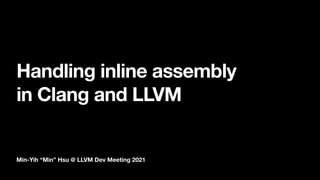

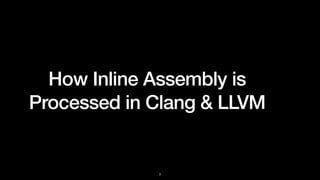










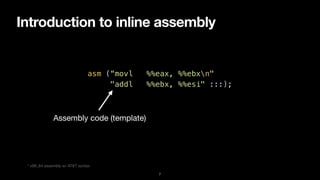




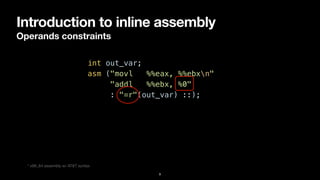
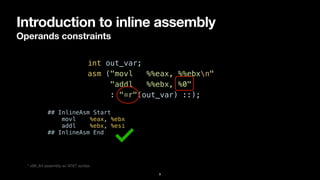



![Operand constraints
10
• ‘r’ : General-purpose register operand
• ‘i’ : Immediate integer operand
• ‘m’ : Memory operand w/ arbitrary addressing mode
Target-independent Constraints
• ‘a’ : AL / AH / EAX / RAX
• ‘I’ : Integer constant in the range of [0, 31]
• ‘N’ : Unsigned 8-bit integer constant
X86 Constraints](https://image.slidesharecdn.com/llvmdevmtg-2021-inlineasm-211119210203/85/Handling-inline-assembly-in-Clang-and-LLVM-24-320.jpg)
![Operand constraints
10
• ‘r’ : General-purpose register operand
• ‘i’ : Immediate integer operand
• ‘m’ : Memory operand w/ arbitrary addressing mode
Target-independent Constraints
• ‘a’ : AL / AH / EAX / RAX
• ‘I’ : Integer constant in the range of [0, 31]
• ‘N’ : Unsigned 8-bit integer constant
X86 Constraints
• ‘J’ : 16-bit signed integer constant
• “Ci” : Constant integers
• “Cj” : Constant signed integers that do NOT
fi
t in 16 bits
M68k Constraints](https://image.slidesharecdn.com/llvmdevmtg-2021-inlineasm-211119210203/85/Handling-inline-assembly-in-Clang-and-LLVM-25-320.jpg)
![Operand constraints
10
• ‘r’ : General-purpose register operand
• ‘i’ : Immediate integer operand
• ‘m’ : Memory operand w/ arbitrary addressing mode
Constraint Modifers
Target-independent Constraints
• ‘=‘ : This is an output operand
• ‘+’ : This is an input / output operand
• ‘a’ : AL / AH / EAX / RAX
• ‘I’ : Integer constant in the range of [0, 31]
• ‘N’ : Unsigned 8-bit integer constant
X86 Constraints
• ‘J’ : 16-bit signed integer constant
• “Ci” : Constant integers
• “Cj” : Constant signed integers that do NOT
fi
t in 16 bits
M68k Constraints](https://image.slidesharecdn.com/llvmdevmtg-2021-inlineasm-211119210203/85/Handling-inline-assembly-in-Clang-and-LLVM-26-320.jpg)
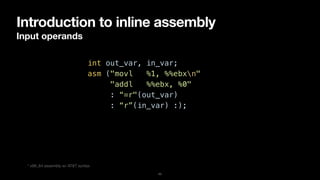
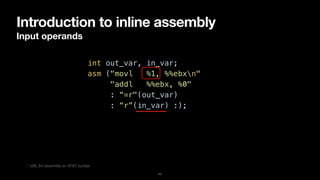





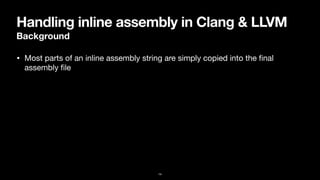


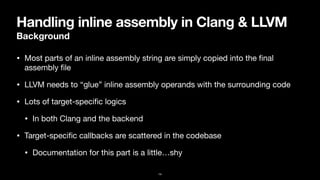




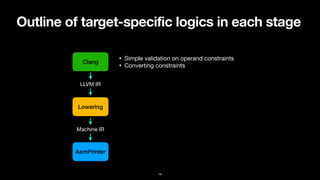
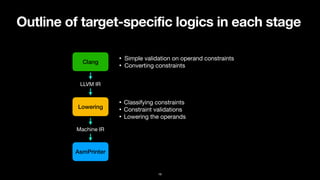






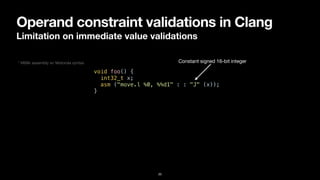








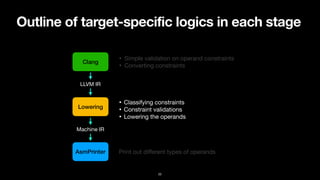
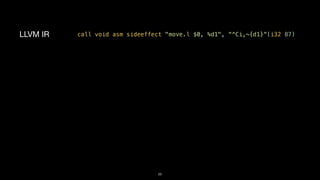








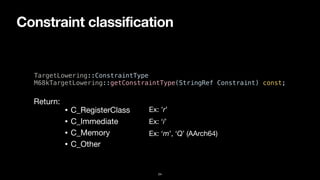



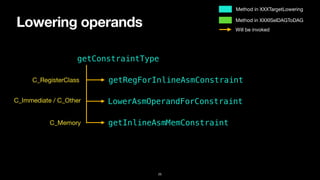



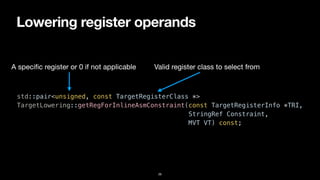
![Lowering register operands
M68k Example
27
std::pair<unsigned, const TargetRegisterClass *>
M68kTargetLowering::getRegForInlineAsmConstraint(const TargetRegisterInfo *,
StringRef Constraint,
MVT VT) const {
switch (Constraint[0]) {
case 'a':
switch (VT.SimpleTy) {
case MVT::i16:
return std::make_pair(0U, &M68k::AR16RegClass);
}
}
}](https://image.slidesharecdn.com/llvmdevmtg-2021-inlineasm-211119210203/85/Handling-inline-assembly-in-Clang-and-LLVM-78-320.jpg)
![Lowering register operands
M68k Example
27
std::pair<unsigned, const TargetRegisterClass *>
M68kTargetLowering::getRegForInlineAsmConstraint(const TargetRegisterInfo *,
StringRef Constraint,
MVT VT) const {
switch (Constraint[0]) {
case 'a':
switch (VT.SimpleTy) {
case MVT::i16:
return std::make_pair(0U, &M68k::AR16RegClass);
}
}
}](https://image.slidesharecdn.com/llvmdevmtg-2021-inlineasm-211119210203/85/Handling-inline-assembly-in-Clang-and-LLVM-79-320.jpg)



![Lowering immediate / other operands
M68k Example
30
void M68kTargetLowering::LowerAsmOperandForConstraint(SDValue Op,
std::string &Constraint,
std::vector<SDValue> &Ops,
SelectionDAG &DAG) const {
switch (Constraint[0]) {
case 'J': { // constant signed 16-bit integer
}
}
}](https://image.slidesharecdn.com/llvmdevmtg-2021-inlineasm-211119210203/85/Handling-inline-assembly-in-Clang-and-LLVM-83-320.jpg)
![Lowering immediate / other operands
M68k Example
31
void M68kTargetLowering::LowerAsmOperandForConstraint(SDValue Op,
std::string &Constraint,
std::vector<SDValue> &Ops,
SelectionDAG &DAG) const {
switch (Constraint[0]) {
case 'J': { // constant signed 16-bit integer
if (auto *C = dyn_cast<ConstantSDNode>(Op)) {
int64_t Val = C->getSExtValue();
}
}
}
}](https://image.slidesharecdn.com/llvmdevmtg-2021-inlineasm-211119210203/85/Handling-inline-assembly-in-Clang-and-LLVM-84-320.jpg)
![Lowering immediate / other operands
M68k Example
32
void M68kTargetLowering::LowerAsmOperandForConstraint(SDValue Op,
std::string &Constraint,
std::vector<SDValue> &Ops,
SelectionDAG &DAG) const {
switch (Constraint[0]) {
case 'J': { // constant signed 16-bit integer
if (auto *C = dyn_cast<ConstantSDNode>(Op)) {
int64_t Val = C->getSExtValue();
if (isInt<16>(Val)) {
Ops.push_back(Op);
return;
}
}
}
}
}](https://image.slidesharecdn.com/llvmdevmtg-2021-inlineasm-211119210203/85/Handling-inline-assembly-in-Clang-and-LLVM-85-320.jpg)




![Lowering memory operands
Memory constraint classi
fi
cation — RISCV Example
34
unsigned RISCVTargetLowering::
getInlineAsmMemConstraint(StringRef ConstraintCode) const {
switch (ConstraintCode[0]) {
case 'A':
return InlineAsm::Constraint_A;
...
}
...
}](https://image.slidesharecdn.com/llvmdevmtg-2021-inlineasm-211119210203/85/Handling-inline-assembly-in-Clang-and-LLVM-90-320.jpg)

